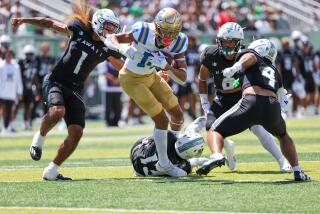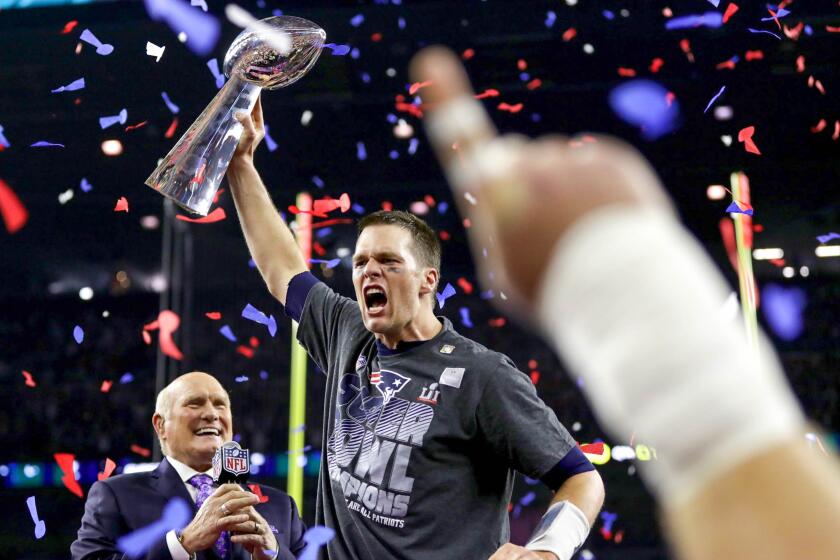The Formative Years
- Share via
With the numbers John Elway put up at Stanford, you’d figure he finished his career as a Cardinal in a blaze of glory.
Instead it ended with one of the most bizarre plays in college football history--the wild, five-lateral scramble that ended with California’s Kevin Moen rambling through the Stanford band for the winning touchdown in the 1982 Big Game.
Elway watched from the sideline, helpless.
A bowl representative was on the phone in the press box, ready to extend an invitation to the Cardinal.
But Elway’s last chance at a college bowl game was going, going, gone with that controversial final play.
That was sort of the way it went during Elway’s days at Stanford.
He passed for 9,349 yards--Steve Stenstrom later passed him as the school’s all-time leader--and 77 touchdowns--still a record--and in 1982 finished second to Herschel Walker in the voting for the Heisman Trophy.
But Stanford was only 20-23-1 in Elway’s four seasons from 1979-82, the final three as the starting quarterback.
The Cardinal football team was exciting, but something always got in the way of the success Elway and some talented teammates seemed to deserve.
“We were talented on offense. That’s it,” teammate Darrin Nelson said with a laugh.
“We’d score 35 or 40 points and lose. We had a rash of injuries defensively,” said Nelson, Stanford’s all-time leading rusher and now an assistant athletic director for community relations at the school after an 11-year NFL career.
“Many a time we’d be down 14 points or 10 points late, and he’d drive us down the field. He always had that cool, calm demeanor.”
Stanford’s greatest victory during the Elway years was the 1980 upset of Oklahoma, 31-14, at Norman.
“Oklahoma had won 22 straight, and the score at halftime was 31-0 in favor of Stanford,” said Paul Wiggin, the coach at Stanford from 1980-83 and now an assistant general manager with the Minnesota Vikings.
“That day on TV, the guy in the studio said, ‘That’s got to be backward.’ ”
It wasn’t.
Some of the most emotionally wrenching games for Elway and his family were when Stanford played San Jose State, where Jack Elway was coach. (Later, when his son was in the NFL, Jack Elway coached at Stanford from 1984-88.)
Elway’s junior year against San Jose State, he threw five interceptions and was sacked seven times in a 28-6 loss. Elway played despite a sprained ankle.
His father was upset with the Stanford coaches for not taking his son out. His mother called it “a wrenching experience.”
But even in those days, you wouldn’t have found many doubters Elway was headed for great things. He was an All-American as a sophomore, remarkable for a quarterback, and again as a senior.
“I don’t know all the little things about quarterbacking, the biomechanics, but if you stood behind John Elway and watched him throw, you knew,” Wiggin said.
“Yeah,” Nelson said, laughing. “He threw way too hard, and kept hurting people’s fingers.”
The coaches told the receivers to get used to it. They weren’t asking Elway to change a thing.
“That was the thing in practice, the Elway cross,” Nelson said. “You know that little cross on the end of the football? The Elway cross would be on your chest or the palm of your hand.”
That marvelous arm wasn’t only put to use on the football field. Elway played two seasons of baseball at Stanford before being drafted by the Yankees and playing one season in the minors.
Even Wiggin went to see him play.
“Everybody did. If you got a base hit to right field, you didn’t round first casually. He’d pick you off so fast.”
Elway’s Stanford football career ended with “The Play,” but he left plenty of memorable moments behind.
“The play I think about was against USC,” said Ken Margerum, who went on to an NFL career and now is a coach at Menlo College. “It seemed like he scrambled for 20 minutes, but it must have been 20 seconds. I kept going longer and longer, and Ronnie Lott was chasing me and John threw it over his head to me in the back of the end zone. That was a signature play of his young days.”
That was another loss, by the way.
But it was the 1982 Big Game that Elway has called “one of the most unpleasant times of all.”
“John doesn’t want to hear about that,” Margerum said, although many people remember how how Elway made a big play from fourth-and-17 in his territory to set up what seemed like the winning field goal in what turned out to be a 25-20 loss.
“I’ll say this, all his career, up to the end, he was always asked to do more than he could do,” Wiggin said. “It wasn’t because of John they lost the Super Bowl or we didn’t go to a bowl game. It was because they couldn’t put the surrounding cast together. But here at the end, Denver had the defense, and of course they have Terrell Davis at running back. They completed the package.”
Margerum feels the same way.
“I’m just proud of the way he persisted. He was able to hang in there,” he said. “I’m just proud of him. Real proud.
“He’s able to leave satisfied with his football career, for the rest of his life. Instead of never playing in a bowl game and losing in the Super Bowl, he’s leaving a two-time champion.”
More to Read
Go beyond the scoreboard
Get the latest on L.A.'s teams in the daily Sports Report newsletter.
You may occasionally receive promotional content from the Los Angeles Times.










